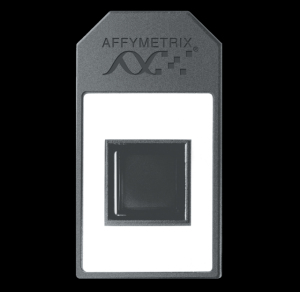Affymetrix Hit With Patent Suit by MIT
by
Joan Trombetti, Writer | August 12, 2008

GeneChip probe array
(Image courtesy of Affymetrix)
MIT has filed a lawsuit against biotechnology company Affymetrix, alleging the company's GeneChip technology infringes an existing MIT patent.
The complaint accuses Affymetrix for knowingly infringing the patent and involving others to infringe by marketing the technology in the United States. It cites E8 Pharmaceuticals and MIT as plaintiffs. E8 Pharmaceuticals is a company co-founded by MIT Biology Professor David E. Housman, who is also a co-inventor of the patented technology.
Affymetrix has filed a notice about the lawsuit with the U.S. Securities and Exchange Commission. It states, "We believe that the plaintiffs' claims are without merit and will vigorously defend against the claims advanced in the complaint." According to its web site, Affymetrix invented its GeneChip technology in the late 1980s, with the company now offering "the gold standard tool for analyzing complex genetic information."
The Affymetrix public relations manager declined to comment, citing pending litigation. The plaintiffs and their attorneys also declined to comment.
MIT and Affymetrix have had prior problems. In 2004, the U.S. patent office assigned MIT the patent, naming Housman as co-inventor. A year later, Affymetrix sought a patent for the same technology, therefore provoking the patent office to interfere. In 2007, the patent office determined Housman and his associates as the inventors.
The technology causing the dispute is essentially an efficient DNA microarray. According to the complaint filed by MIT, the technology allows users to cost-effectively analyze genes with minute DNA samples and few reactants, yet yielding results previously considered impossible, even in laboratories employing thousands of different reactants.
DNA microarrays, also known as gene chips, are commonly used in a variety of disciplines such as gene expression analysis, toxicology, and forensic analysis. The chips are single-use, can be customized for a specific organism or to target certain genes, and cost about $200 to $400 dollars each.
Besides supplying products to MIT laboratories, Affymetrix actually has ties to MIT and Harvard's Broad Institute, collaborating with Broad to develop some of its newest gene chips. How the lawsuit will affect the relationship is unknown.
If MIT wins, up to three times the damages plus interest and attorneys' fees could be awarded, a hefty amount since its claims affect a crucial component of Affymetrix's business, worth $603 million. Affymetrix faced a similar lawsuit against competitor Illumina four years ago in which the jury awarded Affymetrix $90 million. Patent litigation is not uncommon, especially in the field of biotechnology, with most of the cases settled outside of court.
For court documents related to the suit, see http://www-tech.mit.edu/V128/N30/affymetrix/.
